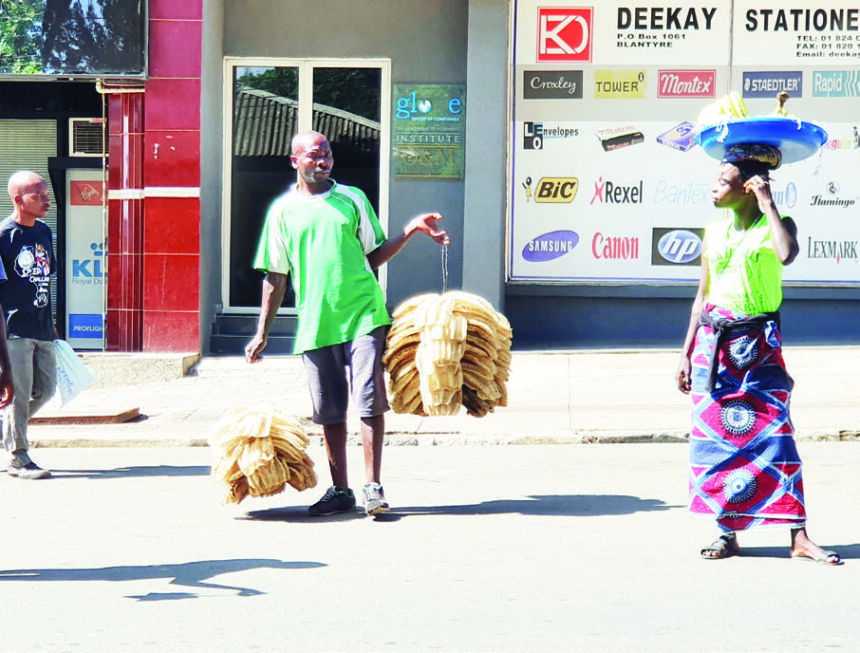Bridget Kananji, a chicken seller in Limbe, Blantyre, has become used to being chased “like a dog and, yet, like all citizens of this country; or, rather, residents of Blantyre City, I deserve better”.
The single woman says she has lost count of all the times city rangers have confiscated her chickens and forced her to pay a K10, 000.00 fine without being taken to court.
“There are several people who sell goods on commission. These people— who sell merchandise on commission— often lose property when city rangers catch them in the streets and grab their property. “To make matters worse, they force us to pay them money at rates that are not standard. They do not even take us to court,” Kananji explains.
She appeals to duty-bearers to put in place mechanisms that will ensure that less privileged people are given a chance to enjoy their right to economic activity.
“For example, they can either secure space for us or let us sell merchandise on the streets freely until they secure space for us. They have to understand that some of us pay school fees and provide the necessities to our dependents,” Kananji points out.
Ronald Nampeya, who is a necktie seller in Blantyre City, concurred.
He explains that, like other vendors, he does not understand why the city council keeps confiscating goods from people who are found selling merchandise in the streets when it is aware that space is a problem in markets.
“When city rangers are confiscating goods from us, they violate our rights. They subject us to human rights abuses because they sometimes use sjambok as if we are dangerous suspects.
“All we are trying to do is to earn an honest living. We have also heard that some of the women traders have been asked to have sex with rangers to have their confiscated goods back,” he claims.
Nampeya says he has seen women traders getting abused by some city rangers.
“At one time, there was a woman who was stripped naked by some city rangers when they were in the course of arresting her. The case is still in court.
“Why can’t they concentrate on constructing big markets, instead of blowing off fuel day in day out chasing innocent people,” Nampeya explains.
He says the Constitution of the Republic of Malawi has provisions that provide for the right to engage in economic activity, as well as to work and pursue a livelihood anywhere in Malawi.

Therefore, Southern Africa Litigation Centre researcher Luntha Chimbwete says what has been happening amounts to the violation of human rights.
She adds that since the Constitution grants people the right to engage in economic activity, there is a need for the authorities to address problems that force people onto the streets.
“Most of these people are poor and sweeping them off the streets without an alternative does not add up. We believe that space should be identified for the sellers.
“Not only that, there should be a transparent mechanism for ensuring that female sellers are not abused by those manning market spaces,” Chimbwete points out.
Project and Paralegal Coordinator at the Centre for Human Rights Education Advice and Assistance, Apatsa Mangwana Mhango, observes that some of the challenges are emanating from lack of space in designated places, a problem she attributes to population increase and poverty.

MHANGO— There is
inadequate space
“Research we did under one of our projects showed that there is inadequate space in designated places, a development that forces people to go onto the streets. These markets were constructed in the 70s, when the population was small. We also found that people with spaces in markets let them out to others at exorbitant fees— which most informal traders cannot afford,” she points out.
She suggests close monitoring of the situation to check against human rights abuses. On his part, Blantyre City Council Deputy Mayor Funny Balaba dismissed allegations that their rangers are violating the rights of vendors.
He says, if anything, city rangers confiscate goods from those that are plying their trade in undesignated places, which, he says, is in line with Blantyre City Council Bylaws.
“What we do is law enforcement and it is for their own good because there have been [bad] accidents that have been happening just because one was selling goods in the streets.
“We also do this to make our city clean,” Balaba indicates.
He has assured city residents that they are working with Ministry of Local Government officials to ensure that there is no bad blood between city authorities and vendors.
In the meantime, tension continues to be in the air between city fathers and vendors.








